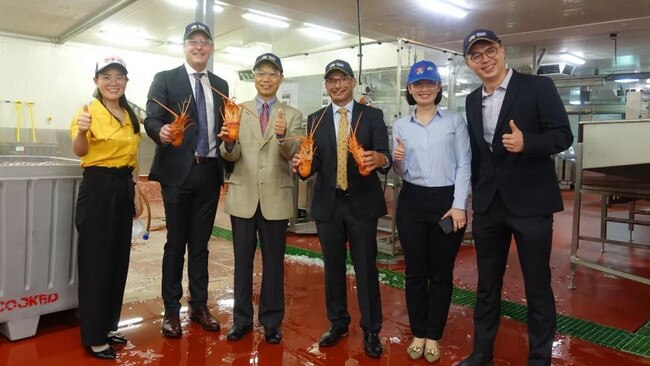Beijing praises Albanese, signals lobster reprieve
China applauds Anthony Albanese’s ‘pragmatic approach’ amid signs the blacklisting of Australia’s $750m live lobster trade may soon end.

Beijing has praised Anthony Albanese’s “pragmatic approach” with China amid signals the black-listing of Australia’s $750m live lobster trade may soon end.
China’s propaganda machine welcomed comments by the Australian Prime Minister in interviews over the weekend, saying he wanted to see “further improvement” in the relationship with Australia’s biggest trading partner.
The Global Times, an often pugnacious party state masthead, said Mr Albanese’s remarks were “undoubtedly commendable” and “marked the latest positive signal in China-Australia relations”.
In an almost identical editorial, the China Daily said the comments were a “welcome signal” that Canberra was “willing to join hands with Beijing”.
“Since Albanese’s Labor government took power in May, it has abandoned its predecessor’s China-bashing stance and opted for a more pragmatic approach toward ties with Beijing,” the China Daily wrote in its lead editorial on Monday.
“There are signs that Beijing and Canberra are translating their messages of goodwill into real action,” the party state masthead said.
The praise for the Albanese government in China’s party state media comes as Beijing begins to unwind some of the trade bans imposed on Australian exports previously worth $20 billion a year.
Customs officials in China’s southern province of Guangdong on Thursday received notice from the local government that they can clear Australian coal shipments, according to the Wall Street Journal.
On the same day, Chinese analysts told the “China Import-Coal Summit” the country needed to diversify its source of imports to increase its energy security, including resuming trade with Australia.
Xiong Chao, chief coal industry analyst at Mysteel, told the summit in Beijing that he expected China would significantly increase purchases of Australian coal in the second half of 2023. The unofficial coal ban has imposed a huge cost on China’s steelmakers, who have lobbied for its unwinding since it began in 2020.
Australia’s lobster farmers are hopeful they will be the second industry to get a reprieve from Beijing’s trade restrictions.
China’s top diplomat in Western Australia last week visited the Geraldton Fishermen’s Co-operative, one of the businesses most badly affected by Beijing’s lobster ban.
Consul General Long Dingbin told the company’s chairman Basil Lenzo and CEO Mark Rutter to make good use of this year’s China International Import Expo, the same Shanghai-based trade show at which China’s customs revealed its ban by blocking 21 tonnes of Australian lobsters in November 2020.
“It is believed that with the joint efforts of all parties, Sino-Australian relations will surely achieve greater development,” Mr Long said, according to China’s consulate general in Perth.
The Australian last week revealed that hundreds of millions of dollars of Australian live lobsters have been smuggled into China since the informal ban was imposed. Taiwan and Hong Kong have been the most popular paths for lobster syndicates.
Those smuggling channels, combined with growing markets in the United States, South East Asia and Australia, have offset some of the brunt of Beijing’s ban.
But Australian lobster farmers hope they will soon no longer have their profits skimmed by racketeers and corrupt officials.
“The fishermen are hanging on every bit of information from China right now,” one lobster exporter told The Australian.
“We’re waiting and hoping,” he said.
In 2019, more than 90 per cent of Australian lobsters were exported to China, where customers pay twice as much for the prized banquet food as consumers anywhere else in the world.
Data compiled by DFAT shows that Australia’s crustacean exports to the world — which are dominated by the lobster trade — have halved from $1.1b to $550m since China imposed its ban.





To join the conversation, please log in. Don't have an account? Register
Join the conversation, you are commenting as Logout